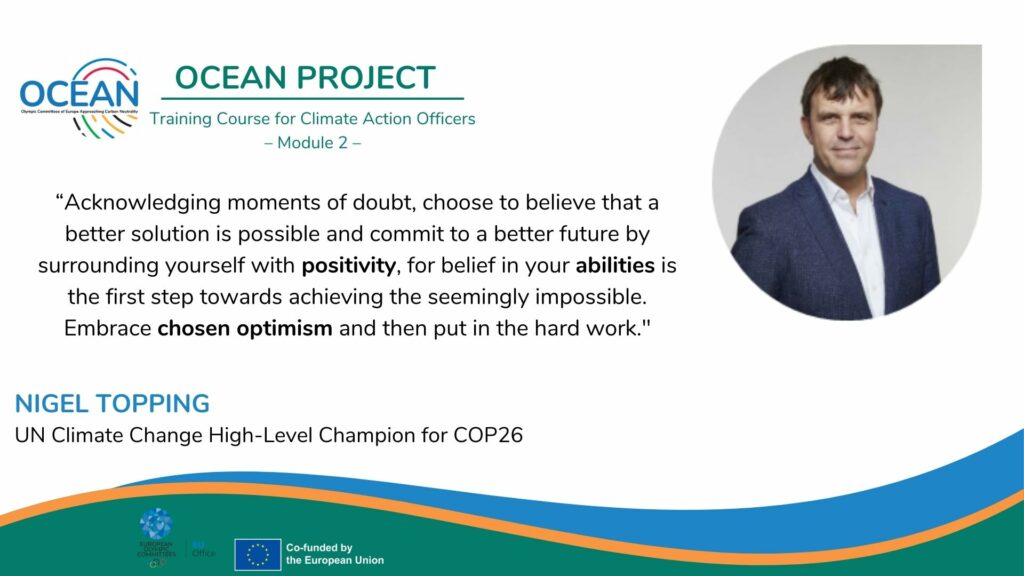The OCEAN project is moving forward after completing the second module of the Training Course for Climate Action Officers, organised by Lina Taylor, Olympian and Founder of Climate Executive Coaching. Climate Action Officers from each partner NOC had the opportunity to receive advice on leadership in sustainability from Climate Executive Coaching professionals as well as distinguished visitors over four weeks. OCEAN was honoured to have Nigel Topping, UN Climate Change High-Level Champion, Julie Duffus, IOC Sustainability Senior Manager, and Jon Wyatt, Sport and Sustainability Director of the International Hockey Federation (FIH).

Week 1 – Leading for Sustainability in Sport
Climate Action Officers shared their wishes regarding their NOC's environmental future as well as the difficulties they are facing when working on their NOC’s footprint. Coaches presented the "leadership value chain" to discover viable choices for a more sustainable sports governance. Climate Action Officers were given coaching tips that included key leadership qualities on how to get everyone on board.
Week 2 – Change Management Skills – Building Opportunities
OCEAN welcomed Jon Wyatt, Sport and Sustainability Director of the International Hockey Federation (FIH), who shared its management expertise and emphasised on the importance of effective communication across different levels of sports organisations, particularly between athletes and leadership boards. Furthermore, Climate Action Officers were presented with various personality types and how to use different communication techniques according to the interlocutor through practical exercises.
Week 3 – Culture Change Skills – Transformation Through Storytelling
The third session of the Training Course aimed to provide Climate Action Officers with information on how to implement a cultural shift towards greener sports. OCEAN had the privilege of hosting Nigel Topping, UN Climate Change High-Level Champion, whose role is to strengthen collaboration and drive action from businesses, investors, organisations, cities and regions on climate change, and coordinate this work with governments and parties to the United Nations Framework Convention on Climate Change (UNFCCC). Nigel Topping stressed the significance of good narrative and alignment of interests among many stakeholders when tackling sustainability strategy in sports.

Week 4 – Business Case for Sustainability in the Olympic Movement
Climate Action Officers had the opportunity to interact with Julie Duffus, IOC Sustainability Senior Manager, who discussed the business aspects of sustainability in sports with Manuel Parga, NOC of Spain, and Climate Executive Coaching experts. Climate Action Officers identified the beneficial impact that investing in sustainability can have on sports organisations.
The OCEAN project is thankful for the involvement of Climate Executive Coaching in this Module 2, whose specialists will continue coaching Climate Action Officers in the following weeks, this time in the format of individual meetings. The journey of OCEAN Climate Action Officers throughout the OCEAN project will continue with Module 3 in March 2023, when the consortium will assemble in Lausanne at the IOC and ANOC headquarters. Meanwhile, the Öko Institute will host Seminar 2 on carbon footprint measuring in December.

The OCEAN project is moving forward with the organization of a 2nd Seminar and the 1st Consortium Call. These two events were designed to bring further knowledge about the Carbon measurement process to the partners, but also to gather their feedback on it. Moreover, the members received additional information about external project binding together sport and environmental issue.
On the 19th of September the 2nd Online Seminar of the Ocean project dedicated to the Carbon Footprint measurement took place. This meeting led by the Öko Institut had the objective to refine and precise the criteria which will be used in the measurement of the NOCs’ carbon footprint and collect feedback on potential difficulties Climate Action Officers are facing during the data collection phase.
The project is now entering a new phase with the full completion of the measurement tool by the NOCs. The Öko Institut presented the tool they are currently designing and collected the partners’ views on potential supplementary criteria to define with precision their carbon consumption.
Additionally, partners received a presentation from the Paris 2024 Organising Committee and CNOSF team. The emphasis was purposefully oriented toward the sustainability axe of the forthcoming games and the reflection which takes place months in advance to organize a sustainable event. With that objective in mind the French Ministry of sport, in collaboration with ADEME (Environmental and Energy Control Agency), the CNOSF and the Organizing Committee Paris 2024, developed an instrument able to easily estimate the carbon footprint of manifestations: The Climate Coach for Events.
Another event punctuated the OCEAN project agenda as on the 20th of September was held the first consortium call. This online meeting was led by the EOC EU office in order to establish a first feedback session on the different actions already initiated and provide an overview of upcoming tasks. The date and speaker of the October sessions was shared. Lina Taylor, a former Olympian and currently Climate Coach will be in charge of this session.
Afterwards, the discussion moved to the expectations and challenges faced by the consortium members in the implementation of the carbon footprint measurement (time required and specific methodology applied). The next step of the OCEAN project is scheduled to take place during the month of October with the beginning of the Module 2.2. Climate Action Officers will now start the complete carbon footprint measurement of their organization.

